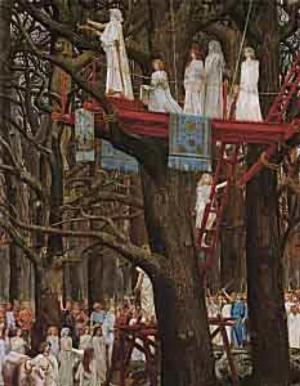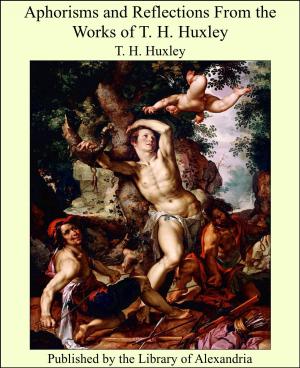The Mystic Will: A Method of Developing and Strengthening the Faculties of the Mind, through the Awakened Will by a Simple, Scientific Process Possible to Any Person of Ordinary Intelligence
Nonfiction, Religion & Spirituality, New Age, History, Fiction & Literature| Author: | Charles Godfrey Leland | ISBN: | 9781465606372 |
| Publisher: | Library of Alexandria | Publication: | March 8, 2015 |
| Imprint: | Language: | English |
| Author: | Charles Godfrey Leland |
| ISBN: | 9781465606372 |
| Publisher: | Library of Alexandria |
| Publication: | March 8, 2015 |
| Imprint: | |
| Language: | English |
It happened recently to me, as I write, to see one afternoon lying on the side walk in the Via Calzaioli in Florence what I thought was a common iron screw, about three inches in length, which looked as if it had been dropped by some workman. And recalling the superstition that it is lucky to find such an object, or a nail, I picked it up, when to my astonishment I found that it was a silver pencil case, but made to exactly resemble a screw. Hundreds of people had, perhaps, seen it, thought they knew all about it, or what it was, and then passed it by, little suspecting its real value. There is an exact spiritual parallel for this incident or parable of the screw-pencil in innumerable ideas, at which well-nigh everybody in the hurrying stream of life has glanced, yet no one has ever examined, until someone with a poetic spirit of curiosity, or inspired by quaint superstition, pauses, picks one up, looks into it, and finds that It has ingenious use, and is far more than it appeared to be. Thus, if I declare that by special attention to a subject, earnestly turning it over and thinking deeply into it, very remarkable results may be produced, as regards result in knowledge, every human being will assent to it as the veriest truism ever uttered; in the fullest belief that he or she assuredly knows all that. Yet it was not until within a very few years that I discovered that this idea, which seemed so commonplace, had within it mysteries and meanings which were stupendously original or remarkable. I found that there was a certain intensity or power of attention, far surpassing ordinary observation, which we may, if we will, summon up and force on ourselves, just as we can by special effort see or hear far better at times than usually. The Romans show by such a phrase as animum adjicere, and numerous proverbs and synonyms, that they had learned to bend their attention energetically. They were good listeners, therefore keen observers. Learning to control or strengthen the Will is closely allied to developing Attention and Interest, and for reasons which will soon be apparent, I will first consider the latter, since they constitute a preparation or basis for the former. And as preliminary, I will consider the popular or common error to the effect that everyone has alloted to him or to her just so much of the faculty of attention or interest as it has pleased Nature to give—the same being true as regards Memory, Will, the Constructive or Artistic abilities, and so on—when in very truth and on the warrant of Experience all may be increased ad infinitum.Therefore, we find ignorant men complacently explaining their indifference to art and literature or culture on the ground that they take no interest in such subjects, as if interest were a special heaven-sent gift. Who has not heard the remark, "He or she takes such an interest in so many things—I wish that I could." Or, as I heard it very recently expressed, "It must be delightful to be able to interest one's self in something at any time." Which was much the same as the expression of the Pennsylvania German girl, "Ach Gott! I wisht I hat genius und could make a pudden!"
It happened recently to me, as I write, to see one afternoon lying on the side walk in the Via Calzaioli in Florence what I thought was a common iron screw, about three inches in length, which looked as if it had been dropped by some workman. And recalling the superstition that it is lucky to find such an object, or a nail, I picked it up, when to my astonishment I found that it was a silver pencil case, but made to exactly resemble a screw. Hundreds of people had, perhaps, seen it, thought they knew all about it, or what it was, and then passed it by, little suspecting its real value. There is an exact spiritual parallel for this incident or parable of the screw-pencil in innumerable ideas, at which well-nigh everybody in the hurrying stream of life has glanced, yet no one has ever examined, until someone with a poetic spirit of curiosity, or inspired by quaint superstition, pauses, picks one up, looks into it, and finds that It has ingenious use, and is far more than it appeared to be. Thus, if I declare that by special attention to a subject, earnestly turning it over and thinking deeply into it, very remarkable results may be produced, as regards result in knowledge, every human being will assent to it as the veriest truism ever uttered; in the fullest belief that he or she assuredly knows all that. Yet it was not until within a very few years that I discovered that this idea, which seemed so commonplace, had within it mysteries and meanings which were stupendously original or remarkable. I found that there was a certain intensity or power of attention, far surpassing ordinary observation, which we may, if we will, summon up and force on ourselves, just as we can by special effort see or hear far better at times than usually. The Romans show by such a phrase as animum adjicere, and numerous proverbs and synonyms, that they had learned to bend their attention energetically. They were good listeners, therefore keen observers. Learning to control or strengthen the Will is closely allied to developing Attention and Interest, and for reasons which will soon be apparent, I will first consider the latter, since they constitute a preparation or basis for the former. And as preliminary, I will consider the popular or common error to the effect that everyone has alloted to him or to her just so much of the faculty of attention or interest as it has pleased Nature to give—the same being true as regards Memory, Will, the Constructive or Artistic abilities, and so on—when in very truth and on the warrant of Experience all may be increased ad infinitum.Therefore, we find ignorant men complacently explaining their indifference to art and literature or culture on the ground that they take no interest in such subjects, as if interest were a special heaven-sent gift. Who has not heard the remark, "He or she takes such an interest in so many things—I wish that I could." Or, as I heard it very recently expressed, "It must be delightful to be able to interest one's self in something at any time." Which was much the same as the expression of the Pennsylvania German girl, "Ach Gott! I wisht I hat genius und could make a pudden!"















